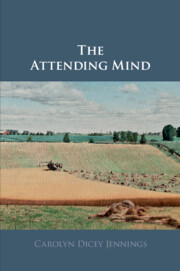Book contents
- Frontmatter
- Contents
- Acknowledgements
- 1 Introduction
- 2 The Philosophical Landscape on Attention
- 3 Attention, Mental Causation, and the Self
- 4 Attention, Perception, and Knowledge
- 5 Attention, Consciousness, and Habitual Behavior
- 6 Attention, Action, and Responsibility
- 7 Conclusion
- Appendix A Mental Causation and Its Problems
- Appendix B The Conceptual History of Top-Down Attention
- Appendix C Top-Down Attention and the Brain
- Appendix D Working Memory and Attention
- References
- Index
4 - Attention, Perception, and Knowledge
Published online by Cambridge University Press: 14 February 2020
- Frontmatter
- Contents
- Acknowledgements
- 1 Introduction
- 2 The Philosophical Landscape on Attention
- 3 Attention, Mental Causation, and the Self
- 4 Attention, Perception, and Knowledge
- 5 Attention, Consciousness, and Habitual Behavior
- 6 Attention, Action, and Responsibility
- 7 Conclusion
- Appendix A Mental Causation and Its Problems
- Appendix B The Conceptual History of Top-Down Attention
- Appendix C Top-Down Attention and the Brain
- Appendix D Working Memory and Attention
- References
- Index
Summary
Many think of the difference between sensation and perception in terms of information – perception carries information, but sensations, the raw feels that occur prior to perception, do not. A standard, biological account of information holds that it occurs only for information consumers. How is it that sensations become informational, and to whom do they become informational? In this chapter I argue that perception comes about due to attention directed by a subject. Attention is the process by which sensations are organized according to the subject’s interests, allowing them to have meaning for the subject, or to become informational for the subject. I compare this account to those that find attention to be necessary for the binding of features into objects, the creation of an objective spatial framework, or perceptual knowledge. I reject the first two accounts, ultimately arguing for a similar conclusion to those in the third, such as Campbell and Dickie. Experiential support for my account is the universal foreground/background structure of conscious perception, a structure that I argue depends on attention. Along the way I discuss at length the work of Treisman and Merleau-Ponty.
Keywords
Information
- Type
- Chapter
- Information
- The Attending Mind , pp. 75 - 116Publisher: Cambridge University PressPrint publication year: 2020
